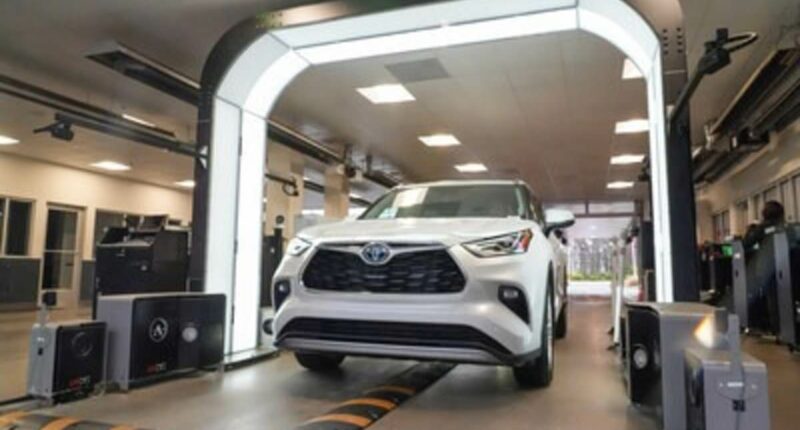Share this @internewscast.com
Hertz has finally admitted its new dystopian damage detectors make costly mistakes following an avalanche of complaints from furious customers.
The second-largest car rental company has implemented vehicle scanners equipped with numerous cameras and LED lights at six US airports to streamline damage detection.
This system, however, has sparked controversy, with customers reporting exorbitant fees for insignificant scuffs and dents they claim they didn’t cause or that are nonexistent.
Initially, Hertz strongly supported the technology, stating it was solely for enhancing vehicle safety. The company has since admitted to the Daily Mail that mistakes can occur.
It would not specify how often the scanners are wrong, stating only that discrepancies from its new, fee-inducing tech ‘are the exception’.
One such exception was a case highlighted by the Daily Mail earlier this year.
In one instance, Navy sailor Nadia returned a sedan to a Hertz lot at Hartsfield Airport, Atlanta, in April. A few hours after passing the car through the scanner, she received a notice for $935: $500 for damage and $435 in fees.
The new technology had flagged what it thought were two minor dents on the passenger side.
‘I knew for a fact I didn’t cause any of the damage,’ Nadia told the Daily Mail.

Hertz has rolled out a partnership with AI vehicle scanning company, UVeye
After publicizing her case, Hertz backtracked and dropped its demand for payment. But she is not alone.
So far, six Hertz renters have alerted the Daily Mail to shocking bills for damage they did not cause.
They said they have then struggled to contest the charges or speak directly with a representative.
Adam Foley claimed he was wrongly charged $285 for two minor blemishes on his rented Buick.
Hertz maintained it found fineable damage.
Collision repair expert and chief marketing officer for EpicVIN, Alex Black, reviewed Hertz’s photos and said, ‘It’s possible one fine is merely a reflection or smudge rather than a real dent.’ He mentioned he wouldn’t charge over $150 for such a repair.
‘It’s a shakedown that is extremely off-putting,’ Foley told the Daily Mail.
Meanwhile, a Newark Airport customer shared an email thread after receiving a $416.95 bill for ‘cosmetic damage to the tire rim’.
‘We paid because the rental report warned us of legal action,’ Nadia explained. ‘Traveling left us with a tight schedule. The claim webpage offered no option to speak with a real person.’

Hertz said the system is used to ‘bring much-needed precision, objectivity and transparency’ to damage inspections, but drivers claim they have been hit by unexpected fees

Hertz just beat Wall Street’s revenue expectations and shrank its quarterly losses in its recent earnings call
Another renter in Atlanta was hit with a $190 fine for a minor dent in June.
And one driver received a $440 fine for a small scuff on the wheel.
Despite mounting customer complaints, Hertz said it plans to install more scanners at rental lots across the US.
In April, Hertz told the Daily Mail that its scanners, which are part of a partnership with Israel-based AI startup UVeye, would only be used to guarantee vehicle safety.
The scanners aim to improve damage detection by analyzing cars’ undercarriages and tire tread wear – areas often missed by manual inspection – as they enter and leave the lot.
Customers can request copies of their initial scans, and Hertz said it does not charge for body damage smaller than the size of a golf ball.
The Daily Mail asked UVeye to clarify whether its systems have led to fines for smaller scuffs and marks, but the company did not respond.
‘For over 100 years, manual damage inspections have caused confusion and frustration, creating unnecessary friction with customers,’ Hertz CEO Gil West said during the company’s most recent earnings call.
‘This technology is designed to bring much-needed precision, objectivity and transparency to the process.’

A driver shared her damage fee with the Daily Mail – including $935 for alleged dents that are barely visible. The company has since sent her a letter saying the fees have been eliminated
For Hertz, adopting upgraded technology is a financial necessity. The company has been losing hundreds of millions of dollars each quarter, partly due to investing heavily in a fleet of rapidly depreciating cars.
Preserving vehicle values has become central to Hertz’s financial turnaround.
The rental giant now lists fleet depreciation per vehicle as the top priority in fiscal metrics, with products such as UVeye helping to reduce losses and drive the company back toward profitability.
Hertz is not alone in adopting automated damage detection. Other rental giants, including Sixt, Enterprise and potentially Avis, are starting to roll out similar technologies across the globe.
In one instance, Sixt charged a customer $600 for damage that occurred before his trip. The company later apologized for the mix-up.
But as these scanners become more widely used, renters increasingly face the risk of unexpected fees and an ongoing struggle to prove their innocence.
‘For years, vehicle damage inspections have caused confusion and frustration,’ a Hertz spokesperson told the Daily Mail.
‘The process was manual, subjective, and inconsistent, and that isn’t good enough for our customers or our business. With digital vehicle inspections, we’re introducing much-needed precision, objectivity, and transparency to the process – giving our customers greater confidence that they won’t be charged for damage that didn’t occur during their rental, and a more efficient resolution process when damage does occur. Of the over 500,000 rentals scanned so far, more than 97 percent showed no billable damage. We know change of this scale takes time, and we’re listening, learning, and improving every day. As we said from the start, our goal through this initiative is to enhance the safety, quality, and reliability of our fleet and to create a more consistent rental experience for our customers.
‘This particular case was escalated and reviewed, and we did not pursue any damage charges. Discrepancies are the exception — and when they do occur, we are committed to making it right.’

















